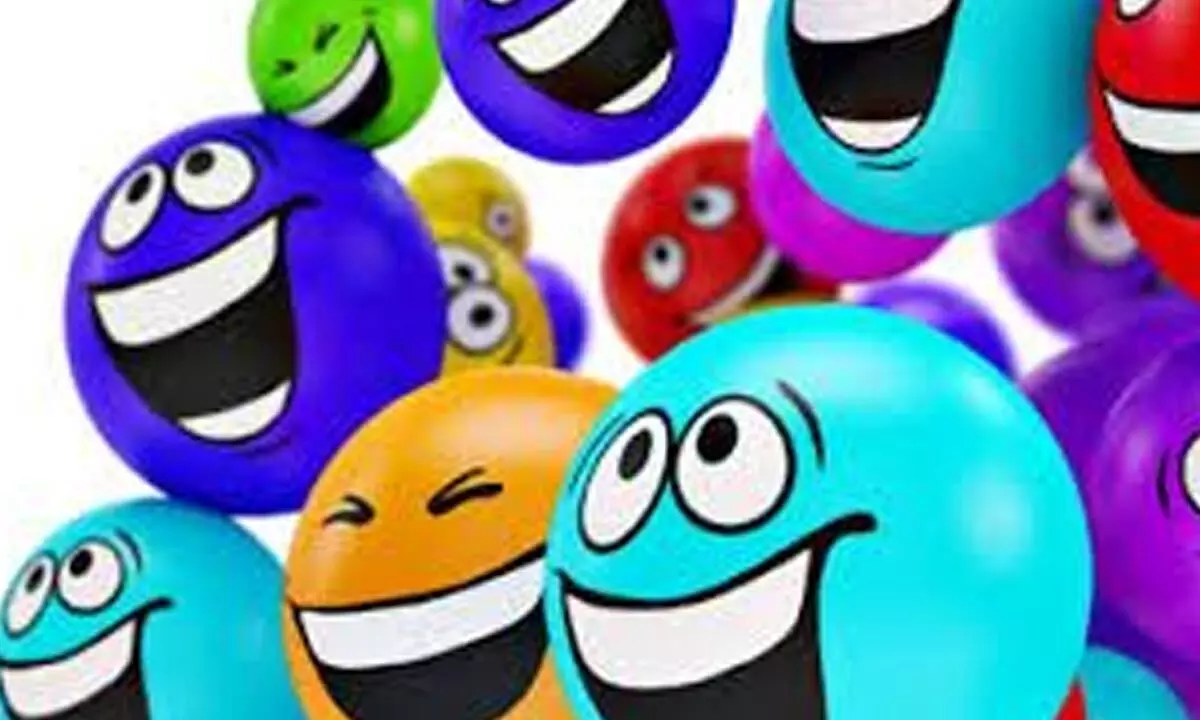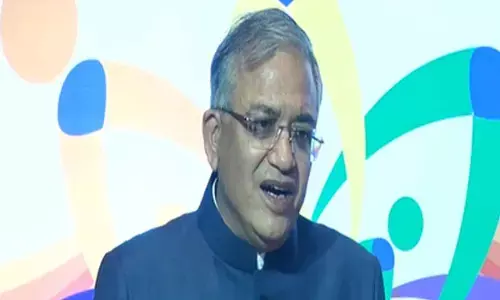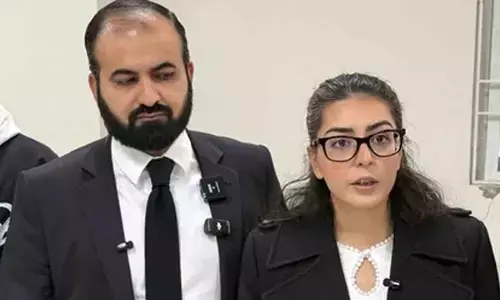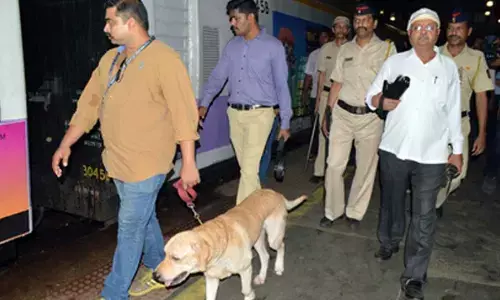An escape valve from life's pressures

Representational image
Nothing can give a columnist greater pleasure than to discover that some people are actually reading his articles, not that yours faithfully can count such readers to more than double digits! Still, I was somewhat taken aback when I received requests that I should write more about the subject of humour and laughter.
Nothing can give a columnist greater pleasure than to discover that some people are actually reading his articles, not that yours faithfully can count such readers to more than double digits! Still, I was somewhat taken aback when I received requests that I should write more about the subject of humour and laughter.
So here goes.
Humour, as we all know, is a function of geography, culture, period and context.
The Americans, for instance, have their own variety, characterised by openness. An example of that can be seen in the movie 'Call Me Bwana,' in which Bob Hope, the famous Hollywood comedian of yesteryear, is alighting from a plane in an African country. Close to the aircraft, there is a lion in a cage, which roars as Hope is coming down the gangway. And Hope clears his throat and says, "Ahem. Excuse me!"
Here is another story related to me by an American friend. When he was thirteen, his father had a heart attack. While the father was in the Intensive Coronary Care Unit (ICCU), Peter, his best mate, decided to pay a visit to cheer him up. Peter was an undertaker, and for his visit put on his mourning suit and top hat with a piece of silk tied around the hat. So there is the old man lying on a bed with the machine that goes 'ping' and an oxygen mask on and in walks Peter with a tape measure in his hand. The father laughed so hard he almost had a relapse and Peter was thrown out by the matron.
Henry Cecil was an American humorous writer of wildly funny novels such as' In laws and Outlaws' and' Friends at court.' In his 'Sunshine Sketchers of a Little Town,' he says about one of his characters: "Pupkin shifted his opinions like the glass in a kaleidoscope."
Of all types of humour it is the British variety that is best known for its weakness for understatement. A typical British gentleman, for instance, when in a major crisis, would tell you, if asked, that he is having "a spot of bother." Another classical piece of understatement I have come across is Ravi Shastri, the cricket commentator, and coach, describing a fielder, who is very sloppy and slow, as one who "is not the fastest of fielders." Another striking piece of understatement came from the Queen of England. Her response to being asked how she was by the Sinn Fein deputy first minister Martin McGuinness, during her visit to Northern Ireland on June 28, 2016. The trip was the Queen's first public engagement since the UK had voted to leave the European Union. "Well, I'm still alive anyway."
Among the most humorous writers I have read are P.G. Wodehouse and Henry Cecil. The discerning reader (one of Wodehouse favourite expressions), will recall that Wodehouse was hailed as the 'performing flea of English literature.' At the end of a chapter in one of his novels, describing the end of an argument between husband and wife. "Bah," said he. Not much of a last word, but, such as it was, he had it. And the inimitable Sir Galahad Threepwood tells us in one of the inimitable Blandings Castle episodes that, "you have to break eggs to make omelets. Not Shakespeare, my own."
Russian humour gains much of its wit from a play on words and associations. Its vast scope ranges from lewd jokes and wordplay to political satire. Among the various genres of Russian humour is the set of jokes borrowed from stories relating to Sherlock Holmes and Watson after Soviet TV broadcast a series of episodes about that legendary duo. One such example is the following joke that is very popular among the Russian community. An example of that is a story which tells us about the Soviet Union having just launched the first man into space. A Georgian shepherd, standing on top of a hill, shouts over to another shepherd on another hill to tell him the news. "The Russians have flown to space!" "All of them?" "No, just one." "So why are you bothering me, then?"
Sherlock Holmes and Dr. Watson go on a camping trip. They pitch their tent under the stars and go to sleep. Sometime in the middle of the night, Holmes wakes Watson up and says: "Watson, look up, and tell me what you see." "I see millions and millions of stars." "And what do you deduce from that?" "Well, if there are millions of stars, and if even a few of those have planets, it's quite likely there are some planets like Earth out there. And if there are a few planets like Earth out there, there might also be life."
"Watson, you idiot, it means that somebody stole our tent!"
Hyderabadi humour is that much richer for being famous for using its own native lexicon, with many words not commonly used elsewhere in the country. It is a heady concoction of words borrowed from Kannada, Telugu (the languages spoken in different parts of the erstwhile Hyderabad state of the Nizam), Urdu, and Hindi in addition, and as already noted, Dakhani. Words like 'hallu,' 'nakko,' 'satrol,' 'haula,' 'potta,' 'potti,' etc. Danda, a popular Hyderabadis satirist in the '50s, used Hyderabadi to critique the then hugely popular Chief Minister Neelam Sanjeeva Reddy. One of his verses implored the government to do more for students:
Taleemnai so bacche
Niklengekan se acche
Taleemphugatdilana
Sanjeeva Reddy mama
(Provide free education, Sanjeeva Reddy! How can kids without education turn out good?)
'Adrak Ke Punjey' is an Indian satirical play written by Babban Khan that ran from 1965 to 2001. The Guinness Book of World Records mentioned it in 1984 as the world's longest-running one man show. The play is a mixture of Urdu and Dakhani. The play ran over 30 years from 1965 to 2001 at Hyderabad and has been mentioned in the Guinness book of world records as the world's longest running 'oneman show.' It is a hilarious portrayal of Hyderabadi culture and ethos, laced with a typically Hyderabadi sense of humour.
Farooq Sheikh, Bollywood actor, was in Hyderabad for a shoot. While he was on his way to a show in an auto rickshaw, along with co-actor Naseeruddin Shah, the auto stopped at a junction, waiting for the traffic light to turn green. The driver of the auto kept honking the horn, causing a lot of irritation to those around. Suddenly, a Rickshawala next to them shouted "ZyadaBajayega to Lal Hara Hotakya? (Will the red light turn green if you keep honking incessantly)? And everyone started laughing!
In 'Adrak Ke Punjey,' a truly classical presentation of the Hyderabadi variety of humour, Rumsu, the protagonist, is once asked by another character for a matchstick or 'Kaadi.' And the retort is that if he had a Kaadi he would have set fire to his house first!
Many other great actors and writers have made an everlasting contribution to humour and comedy. While immortal characters such as Charlie Chaplin and Laurel and Hardy left an unforgettable impression on our generation when we were children, Charles Dickens and Jonathan Swift made contributions to wit and humour which remain fresh in our memory today. In an article of limited length, it is with great regret that one has to exclude detailed a discussion of their work.
The short point is that many great people from Birbal and Tenali Raman to Shankar, cartoonist, have brought sunshine and laughter into our lives, and it is by remaining cheerful and happy that we can celebrate their precious legacy.
(The writer is former Chief Secretary, Government of Andhra Pradesh)
(The opinions expressed in this column are that of the writer. The facts and opinions expressed here do not reflect the viewsof The Hans India)














